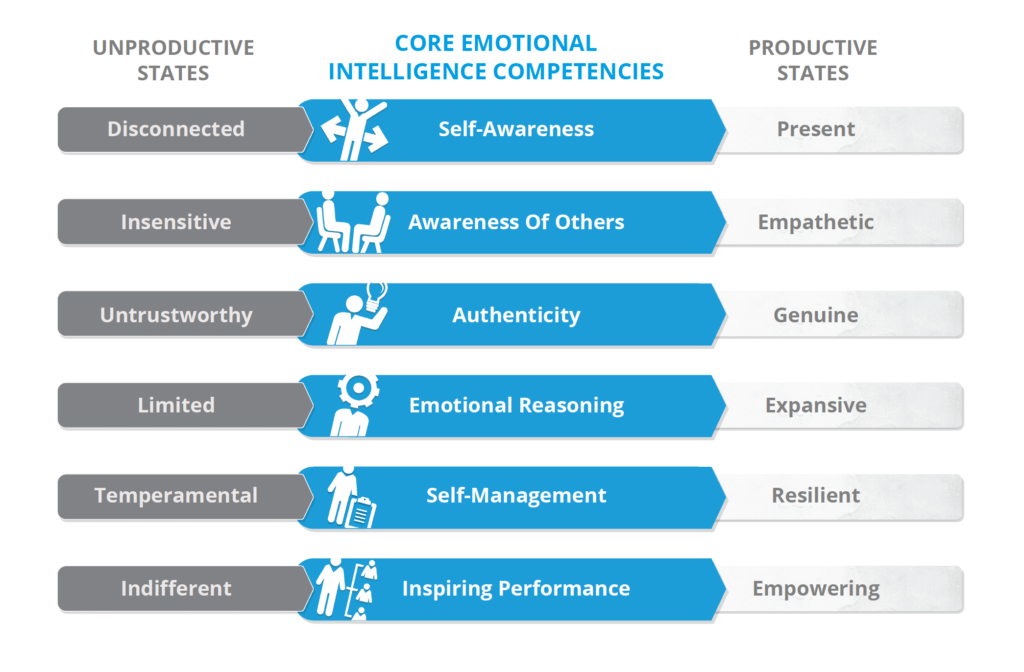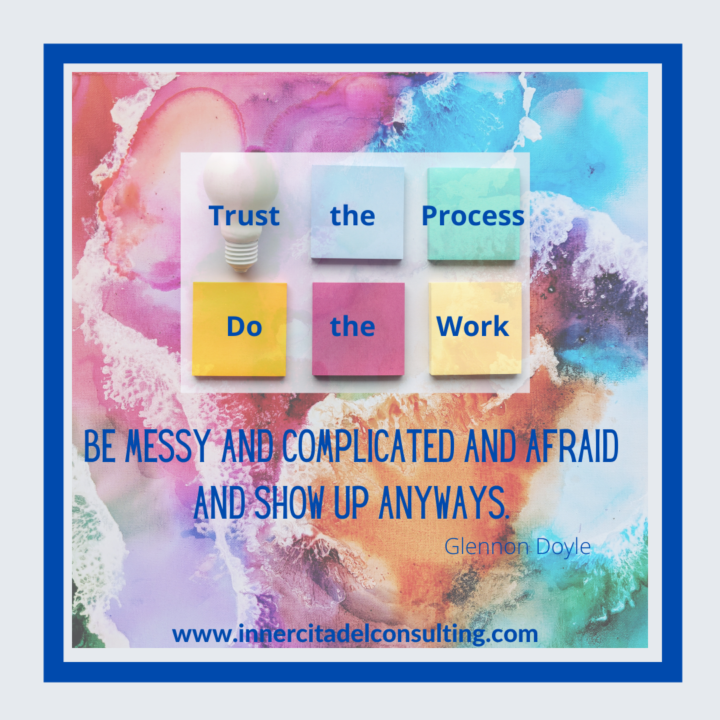EI at work
EI in the Workplace

Pillars of EI in the workplace
Emotional Self-Awareness
Emotional Self-Awareness
Self-Awareness is about being aware of the way you feel and the impact your feelings can have on decisions, behavior and performance. People who are emotionally self-aware are conscious of the role their feelings can play in these areas, and are better equipped to manage this influence effectively. When we are emotionally self-aware we are present with the role feelings are playing in our decisions, behavior and performance. When we are not, we are often disconnected from this influence.
Emotional Awareness of Others
Emotional Awareness of Others
Awareness of others is about perceiving, understanding and acknowledging the way others feel. This skill helps us identify the things that make people feel valued, listened to, cared for, consulted, and understood. It also helps us demonstrate empathy, anticipate responses or reactions, and adjust our behavior so that it fits well with others. When we demonstrate this skill effectively, we come across as being empathetic. People who do not demonstrate this skill can come across as being insensitive to the way others feel.
Authenticity
Authenticity
Authenticity is about openly and effectively expressing oneself, honoring commitments and encouraging this behavior in others. It involves honestly expressing specific feelings at work, such as happiness and frustration, providing feedback to colleagues about the way you feel, and sharing emotions at the right time, to the right degree and, to the right people. People high in authenticity are often described as genuine whereas people low in this skill are often described as untrustworthy.
Emotional Reasoning
Emotional Reasoning
Emotional reasoning is about using the information in feelings (from oneself and others) when decision-making. It involves considering your own and others’ feelings when making decisions, combining the information in feelings with facts and technical information, and communicating this decision-making process to others. Feelings and emotions contain important information. For example, the level of commitment colleagues demonstrate often provides insight into whether a decision is going to be supported; the emotional appeal of products and services often provides insight into selling and marketing messages. When this type of emotional information is combined with facts and technical information, people make expansive, creative and well thought-out decisions. Conversely, people who do not use emotional information and focus on facts or technical information only tend to be limited in their decision-making.
Emotional Self-Management
Emotional Self-Management
Self-Management is about managing one’s own mood and emotions, time and behavior, and continuously improving oneself. The modern workplace is generally one of high demands and pressure, and this can create negative emotions and outcomes. Our mood can be very infectious and can therefore be a powerful force in the workplace; productively or unproductively. This skill helps people be resilientand manage high work demands and stress rather than being temperamental at work. People who are proficient in managing their own emotions are optimistic and look to find the opportunities and possibilities that exist even in the face of adversity.
Authenticity
Positive Influence
Authenticity
Positive Influence
Positive influence is about positively influencing the way others feel through problem solving, feedback, recognizing and supporting others work. It involves creating a positive working environment for others, helping others find effective ways of responding to upsetting events and effectively helping people resolve issues that are affecting their performance. This skill helps people create a productive environment for others. Positive Influence equips you with the capacity to encourage colleagues to cooperate and work effectively together. People who can positively influence others’ moods, feelings and emotions are empowering to work with and easily motivate those around them.
Human-Centered Integrated Learning & Development
Human-centered, with your goals in mind.
Inner Citadel Consulting helps individuals, teams, and leaders Notice, Engage, and Empower emotional intelligence, mindfulness, and workplace communication strategies. Because our approach is human-centered, we recognize that everyone comes to this process with a different set of experiences, motivations, and expectations. So, ICC focuses on understanding you where you are. Then we use our proven process to help you see where you want to go. And we give you tools and support to get you there.
Waste no more time arguing about what a good person is. Become one.
Marcus Aurelius

Integrated
For most high-performing leaders, the boundary between work and the rest of life can be … thin. But the truth is, we are the same people wherever we are. Sure, we may behave differently. But the same brain, with the same habits and triggers, goes to work and goes home. Fighting for a distinction between home life and work life can be exhausting. Instead, let’s fight for a healthier you.
For ICC, “Integrated” means that our work together will benefit your whole life. And it also means that any work we do together will be built around you and your needs. In this way, it is integrated into the current context so we can create a new context. Likewise, the skills we teach are integrated into your self-understanding, so they go with you everywhere (like your brain). Last, the mindsets we nurture will grow over a lifetime.
A lot of people want solutions that are tidy, packaged … and one-and-done. That kind of approach does not recognize how complex people and teams are. So, you can be sure that whatever individual programs, coaching, or team-building and team-healing projects ICC offers, they will be tailored to you.
Learning & Development
Adult learning & development is not linear. With ICC you gain the benefit of over two decades of Peter’s experience working with adult learning. Since ICC program support transformational learning, you can expect to receive support after the “event”. In fact, most real learning happens after a training. First, you develop your skills by practicing them over time. Then, you reflect on your practice and revise your approach. Eventually, the skills, behaviors and mindsets you want are ingrained and truly “learned”. It’s messy, but if you think about anything you really, deeply, learned… you know this is truly how it works.
The time to repair the roof is when the sun is shining.
John F. Kennedy
